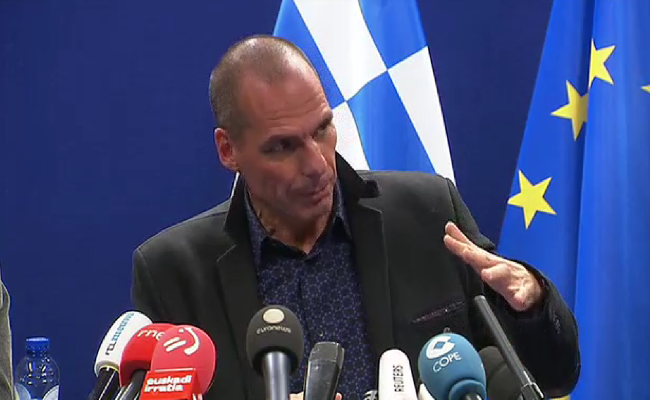By Sara Sjolin, MarketWatch
Former Greek Finance Minister Yanis Varoufakis is back in the spotlight.
A secret tape from a call held between Varoufakis and a large group of hedge funds earlier this month reveals the controversial ex-minister had put an extensive “Plan B” in place to prepare Greece for a parallel payment system if the European Central Bank — as it did — cut off emergency lending to the Greek banking system.
The recording shows just how close the Greek government came to introducing IOUs and a return to the drachma, before Prime Minister Alexis Tsipras gave in to creditors’ demands and accepted strict austerity measures in exchange for a third aid package.
Varoufakis was a vocal opponent of the reform programs demanded by the lenders, a major reason the negotiations between Athens and its creditors hit a stalemate in the spring and early summer. After failing to win support in Syriza’s six-strong inner cabinet to use the “Grexit” threat as a bargaining chip for a better bailout deal, Varoufakis resigned in early July.
The leaked teleconference call, which took place July 16, details to what extent Varoufakis was willing to implement a parallel payment system, including hacking the Greek tax system.
Large chunks of it were revealed by eKathimerini on Sunday. The Official Monetary and Financial Institutions Forum (OMFIF), which hosted the teleconference, published the entire recording on Monday with approval from Varoufakis.
“You can’t tell anyone”
But the conversation wasn’t meant for the ears of the public, according to Varoufakis during the call. While discussing how he authorized a childhood friend to hack into the Greek finance ministry’s software (more on that later), he cautions listeners: “You can’t tell anyone that. This is totally between us.”
“And even if [someone does], I will deny I said it,” Varoufakis adds.
As negotiations between Greece and its creditors reached a stalemate, contingency plans for a Grexit were stepped up. So too, secretly, did Varoufakis and a small team, by using the Greek tax systems website.
“The prime minister before he became PM, before we won the election in January, had given me the green light to come up with a Plan B,” he said on the tape.
“We were planning to create, surreptitiously, reserve accounts attached to every tax file number, without telling anyone, just to have this system in a function under wraps. And, at the touch of a button, to allow us to give PIN numbers to tax file number holders, to taxpayers.”
“This was very well developed and I think it would have made a very big difference because very soon we could have extended it, using apps on smartphones, and it would become a functioning parallel system. And of course this would be euro-denominated, but at the drop of a hat it could be converted to a new drachma.”
Hacking the tax system
However, preparing the parallel payment system wasn’t straightforward. Varoufakis said he appointed a “childhood friend” to execute the plan, but ran into trouble because the tax system largely is controlled by Brussels.
“So we decided to hack into my ministry’s own software program in order to be able break it up to just copy the code of the tax system’s website onto a large computer in his office so that he can work out how to design and implement this parallel payment system.”
A Greek exit from the eurozone has been staved off for now, but Varoufakis said in the teleconference that there’s “absolutely” a risk a Grexit can still happen.
Part of this comes down to German Finance Minister Wolfgang Schäuble being “hellbent on effecting a Grexit,” Varoufakis claimed.
“Schaeuble has a plan. The way he described it to me is very simple. He believes that the eurozone is not sustainable as it is. He believes there has to be some fiscal transfers, some degree of political union,” he said.
“And he said explicitly to me that a Grexit is going to equip him with sufficient bargaining, sufficient terrorizing power in order to impose upon the French that which Paris has been resisting. And what is that? A degree of transfer of budget making powers from Paris to Brussels.”









